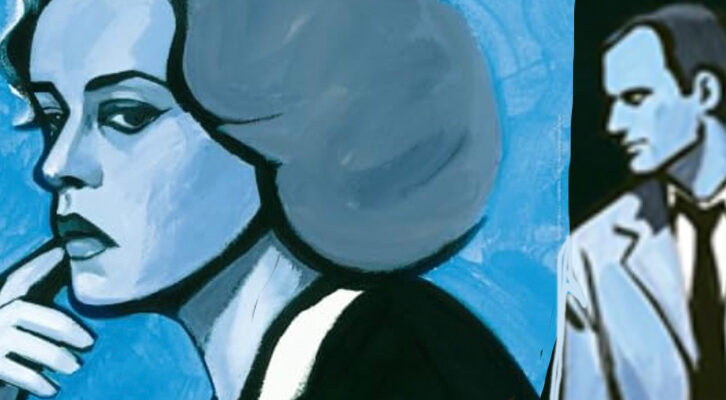Watching Secretary 20 Years Later, Post-#MeToo
Emily Kenway on the Hollywoodization of Predation
When we first met Lee Holloway, she was leaving a psychiatric institution on the day of her sister’s wedding. That was 2002 and Lee, played by Maggie Gyllenhaal, was the heroine of the BDSM rom-com Secretary. Perhaps you remember the movie poster, its strikingly blunt statement of feminine transgression: a woman bent over, black-seamed stockings, hands clasped around crossed ankles.
Instead of relief at her freedom from institutionalization, Lee tells us wistfully, “I’d started to get used to the place… breakfast at 8, classes at 2, therapy at 3 and asleep by 10. Inside, life was simple. For that reason, I was reluctant to go.” She watches the bridesmaids in their whites and pinks, their prom-style curls bouncing as they dance, while she stands apart, pasty in an ill-fitting blue dress that gapes at her breast.
Later, after discovering her father has begun drinking again, we go with her to her bedroom where she retrieves her self-harm kit. A box of blades, swabs, iodine, decorated with glittery butterfly stickers, wrapped in a heart-printed cloth. The kitsch box serves as a metaphor for the film itself: the superficially conventional hiding something darker beneath.
At first, it’s Lee’s existence in a suburban nuclear family that provides this juxtaposition. She lives surrounded by pink-painted walls and cutesy knick-knacks, yet her thighs are tallied with self-inflicted cuts. Later, it’s her life with E. Edward Grey, the lawyer for whom she’s a secretary. She answers the phone politely, folds letters crisply, struts in pussy-bows and pencil-skirts, while furtively becoming his submissive lover.
How would a film of Gaitskill’s story be made today? Would a short story about workplace sexual abuse be translated into a kinky rom-com with a happy ending?I was seventeen when Secretary came to the UK in summer 2003 and I was struck by the similarities between me and Lee. We were both depressed and dislocated from the world. My home life, like hers, was simultaneously turbulent and hollow. In the film, Lee observes her parents as they stumble through life, beseeching each other to do better but lacking the tools to make improvements.
I, too, was bemused by the adults around me, an over-worked and depressed mother and her morose, disdainful partner. I couldn’t make sense of their defeatist, exhausted way of being alive, nor why I was part of it. Secretary was also the first cultural depiction of self-harm I’d seen, the secret tally on my adolescent body made part of a Hollywood love story, complete with a jazzy soundtrack. I lacked a butterfly box, but I understood intimately Lee’s urges.
Though I saw these similarities, it wasn’t what enthralled me back then. It was the film’s message about love. It may be a film about kink, but it contains its transgression within a neatly heteronormative storyline. Lee falls in love with Grey almost instantly. She doesn’t need to know much about him to achieve this, just his willingness to dictate what she should wear, eat, and do. When he chastises her for everything from how she types to how she dresses—“disgustingly”—she wavers, tears up, then recalibrates and wants to thank him because “I am trying to be the very best secretary that I can be for you.” She climaxes recalling his instruction for her to eat only four peas.
For Lee, love means someone seeking dominion over her, the pursuit of what French philosopher Georges Bataille calls “the deliberate loss of self.” It made sense; if my ‘self’ was an uncomfortable place to be, what could be better than to lose it? After all, Lee’s abdication from herself in favor of Grey’s authority cures her: when he instructs her that she’s never to cut herself again, she obeys, triumphantly casting her butterfly box into a river. By the end of the film, she’s married to Grey, waving him off to work from their front porch, limbs tanned and limpid, the picture of contentment.
Things turned out differently for Debby Roe. Secretary is based on a short story of the same title from Mary Gaitskill’s 1988 collection, Bad Behavior. Debby, renamed Lee in the film, inhabits a world of aching banality and building tension. Characters sniffle and wipe their noses, while every verb portends dark clouds ahead – hair is “clenched” in curls, fir trees are “taut,” fingers “pinch” popcorn and smiles “grip” faces. She wakes each morning to see her ceramic weather poodle, “which was supposed to turn pink, blue or green, depending on the weather, but had only turned gray and stayed gray.”
Like Lee, Debby gets a job as a secretary for a lawyer. One day she makes a typing error and he orders her to bend over his desk, looking directly at the offending page. He makes her read it aloud while he spanks her. Her reaction is less straightforward than Lee’s, who decides Grey is the one for her as soon as he outs his BDSM proclivities. For Debby, in contrast, “The word ‘humiliation’ came into my mind with such force that it effectively blocked out all other words.” Two more incidents occur, one in which he makes her bend over and repeat “I’m stupid,” and another in which he masturbates on her behind. Debby never goes back to the office after the final incident. She decides he was an “asshole” and ends the short story alienated from herself in a manner that alludes to trauma-induced disassociation.
Neither Lee nor Debby is asked for their consent at any point, yet the outcome for each woman is different. In the short story, Debby is broken by her experience, at least for now. In the film, Lee is made by hers.
The stark difference in outcome between the heroines begs the question: how would a film of Gaitskill’s story be made today? Would a short story about workplace sexual abuse be translated into a kinky rom-com with a happy ending? Film adaptations rarely stay faithful to their originating texts. Less interesting is the fact of this infidelity than the choices made within it and what they suggest about the cultural mores of the time.
In 2002, the same era as Angelina Jolie proclaimed she wore her then-husband Billy Bob Thornton’s blood around her neck and Britney kissed Madonna at the MTV Music Awards, we wanted titillation wrapped in heteronormativity. This is precisely what Secretary serves us and why Gaitskill has described the film as the Pretty Woman version of her story. Post-MeToo, how might we render Debby’s story?
I suspect it wouldn’t come complete with a sensual jazz soundtrack and glinting engagement ring. Rather, it might draw on aspects of Gaitskill’s story that are harder to Hollywoodize but hugely relevant today. Prominent throughout the story, and indeed the whole collection of which it forms part, are uncomfortable tensions between consent and complicity. Debby masturbates the night after her boss first spanks her. Does this mean she’s turned on? Or that she’s attempting to transmute a violation into something acceptable?
Immediately after it happened, she’d “planned to sink into a stupor of some sort” but couldn’t because a client arrived. In the film, this clash between what’s happening behind closed doors and external appearances is part of the sexily clandestine nature of their encounters, but today it’s more evocative of the victims of the rapist Harvey Weinstein who posed for photos with him because their careers depended on it. It’s a scene familiar to any woman, that brittle moment between the end of an infringement on your body and the continuation of normal life: do you cry out or play nice? Re-reading Gaitskill’s story today, it’s these messy and uncomfortable explorations that feel disconcertingly prescient.
In a 1994 essay for Harper’s magazine, Gaitskill recounts being sixteen and staying at a friend’s house when she was left alone in a room with an older guy. She had sex with him because “I could not face the idea that if I said no, things might get ugly.” After years of trying to articulate the situation, sometimes exaggerating the violence to match it to her feelings of violation, she concluded that “I had, in a sense, raped myself.”
Re-reading Gaitskill’s story today, it’s these messy and uncomfortable explorations that feel disconcertingly prescient.Gaitskill is clear that she’s not partaking in self-recrimination, but instead is asserting that she lacked knowledge of herself back then, in addition to the ability to speak on that self’s behalf against gender conventions. She takes this ambivalence about sexual consent, how it’s both culturally and personally constituted, with her into the Bad Behavior collection. In that world, we can’t tell what characters really think and feel about their sexual situations, often because they can’t themselves. While the film of Secretary bypasses these complexities by having Lee fall in love at first spank, its originating text forces us to acknowledge the uncomfortable complexities of human sex lives.
I wonder what I’d have learned from a script that was closer to Gaitskill’s work. Perhaps I’d have taken a warning with me, instead of an incitement to try to become someone’s prey like Lee. Or perhaps nothing would have changed because there are forces bigger than a film in a seventeen-year-old’s life. I wonder about this, though, because a few years ago, I raped myself too.
I’d been in a relationship with him for several months, a man whom I wouldn’t call a rapist even though, somehow, I ended up feeling raped. The tenor of our relationship had not been dissimilar to Lee’s with Grey. Early jokes about submission had translated into clearly defined roles—he was the dominant one, I what Simone de Beauvoir has called the “privileged prey,” the woman ensnared but luxuriating in the embodiment of that captive role. It was rather like being in the jaws of a much larger animal; afraid, but at least sheltered and warm.
But, as in Secretary, there’d been no conversations about boundaries, no interrogations of psychological maturity or self-hood on which healthy versions of these dynamics ideally exist. The “not-rape” was the final sexual encounter of our relationship—he broke up with me the same weekend. I’d initiated sex that night. I’d felt him pulling away from us and urgently sought to reclaim him in a prehensile, bewildered way. Perhaps because he knew he wanted to end things, that night there came from within him a great physical fury, and it found its place on my body in the guise of sexual intercourse.
Afterwards, I was bruised, shaking and crying, swallowing down the taste of vomit. I was doubly distressed by recognizing my complicity in the situation. All through our relationship, I’d been seeking that abdication of self I’d witnessed work out so well for Lee. I was wrecked by the break-up and its violence, yet confusingly, desperate to rekindle things. I clung to the idea, even months afterwards, that if I could get him back, we could make a tender palimpsest across the pained memory of what had happened. Surely, if someone wants you enough to bruise you, they must love you? I’ve heard of other women who’ve tried initiate sex with their rapist’s/not-rapist’s in the aftermath of an incident, trying to reclaim themselves at the site of their loss.
These incidents are confused, chaotic and hard to define. Despite their prevalence, we still lack the right language to describe them. Every word I could choose seems to malign or absolve, to finger-point or deflect, none of which is quite right. Lee’s world couldn’t have contained this ambivalence and is, perhaps, how I ended up in that mess, expecting love/hate to be clearly demarcated in the world instead of all tangled up. Retracing the film twenty years on, back to its originating text, I find a home for these conflicts, an understanding but, of course, no resolution. In the spirit of which, we can’t know where Lee Holloway would be now. Perhaps still living happily and kinkily ever after. Perhaps realizing that she mistook predation for love all those years ago. Or, most likely, like so many of us, somewhere in between.



















